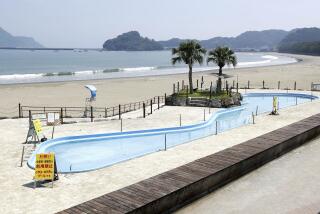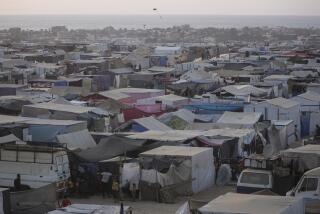Angry Japan Official Rebuffs Critics
- Share via
TOKYO — In a stunning outburst, a top Japanese official today angrily defended his nation’s response to the recent deadly earthquake in western Japan and said that stronger central government action to process foreign aid offers quickly could lead to a “revival of Japanese militarism.”
Kazutoshi Ito, director of the National Land Agency’s disaster prevention coordination division, sharply attacked suggestions that the central government should usurp the role of local authorities to determine needed relief efforts during national emergencies.
For the record:
12:00 a.m. Feb. 2, 1995 For the Record
Los Angeles Times Thursday February 2, 1995 Home Edition Part A Page 3 Column 3 Metro Desk 2 inches; 48 words Type of Material: Correction
Japan rebuke--A story that appeared in The Times on Friday misstated an admonition to a reporter by Kazutoshi Ito, director of the Japanese National Land Agency’s disaster prevention coordination division. Ito did not seek to expel a reporter, who was smiling hello to a colleague. But he did yell, “What are you laughing at? Listen seriously!”
The four-hour delay in Hyogo prefecture’s call to the Self-Defense Forces for assistance, and its sluggish response to aid offers from 55 nations, has sparked widespread criticism that it exacerbated the catastrophe that killed more than 5,000 people and destroyed 74,442 buildings last week in and around the major port city of Kobe.
But Ito, obviously on the edge of his nerves as he smoked, glared and virtually screamed at reporters at a midnight briefing, lashed out in response to questions about whether Japan should change its system.
“In a situation of an emergency like this one, if you are referring to the central government having the power to suppress and suffocate the will on the part of the local municipalities, it reminds me of the rebirth of Japanese militarism,” Ito thundered.
“In the name of the state of emergency, our country restricted the rights of the people and even trampled on the rights of the people. . . . I am firmly resolved we shall never, ever return back to the state of affairs that we were in 50 years ago,” he declared.
A Japanese reporter retorted: “Even at (the price of) killing thousands of people?”
Ito glared and snapped back: “I cannot agree with the use of the expression of ‘killing’ and will ignore that question.”
After the hourlong briefing, in which he impatiently interrupted questioners and yelled at one to leave the room for smiling hello to a friend, Ito stalked out.
“I’m very busy. I have no time to deal with critics,” he said.
The briefing came as criticism mounted that Japan’s convoluted bureaucracy and turf wars among competing ministries had led to critical delays in responding to such offers as specially trained Swiss rescue dogs. Some critics said Japan’s tardy reaction underscored an insular “island mentality” that hampered cooperation with foreign countries.
*
Ito announced today, however, that Japan had accepted offers from 15 of 55 nations as of Wednesday, including a team of seismic experts from the United States and blankets, water, sheets and tents from the U.S. forces in Japan. The Japanese have not requested any other aid offered on an extensive list sent from the U.S. military to the Japan Defense Agency last week, which included sending the aircraft carrier Independence to Kobe to provide 2,000 beds, hot meals and medical supplies.
Japan also accepted blankets, bottled water and other items from Germany, Canada, Britain, South Korea, China, Australia, New Zealand, Thailand, Finland, Brunei, Jordan and Mongolia. In addition, it accepted emergency relief teams from Switzerland and France.
Ito explained that Japanese law required all aid offers to go from the central government to the prefectures, or states, where local officials at the disaster scene could best evaluate the area’s needs. The Foreign Ministry conveyed the aid offers to the land agency, which began to funnel them to local authorities as of Jan. 18, one day after the earthquake.
But because officials in Kobe and in Hyogo prefecture were overwhelmed by the widespread fires, collapsed homes and thousands of dead and dying victims, they could not immediately process the requests, he said.
Ito stressed that Japan never “refused” any offer. In the high-profile case of the Swiss rescue dogs, which the press here reported were initially rejected, Ito said the local authorities could not make immediate arrangements to accommodate them so initially sent back a reply to Switzerland: “We appreciate deeply that such an offer was made and we will be making a request when the necessity arises.”
Eventually, 12 dogs arrived Jan. 19 and left on Jan. 23, after finding nine people dead.
*
Hiroshi Kume, TV Asahi’s popular evening newscaster, blasted the lengthy process as “miserable” after detailing the steps on his national broadcast Wednesday.
In his own emotional news conference, Self-Defense Forces Lt. Gen. Yusuke Matsushima--prohibited by law from dispatching troops not requested by local officials--tearfully apologized for the delayed dispatch of troops to the disaster area for rescues and other tasks.
“I went to the disaster area,” he said, his voice trembling as he wiped away tears. “I’m very sorry. If we had been there, we could have done many things.”
More to Read
Sign up for Essential California
The most important California stories and recommendations in your inbox every morning.
You may occasionally receive promotional content from the Los Angeles Times.














